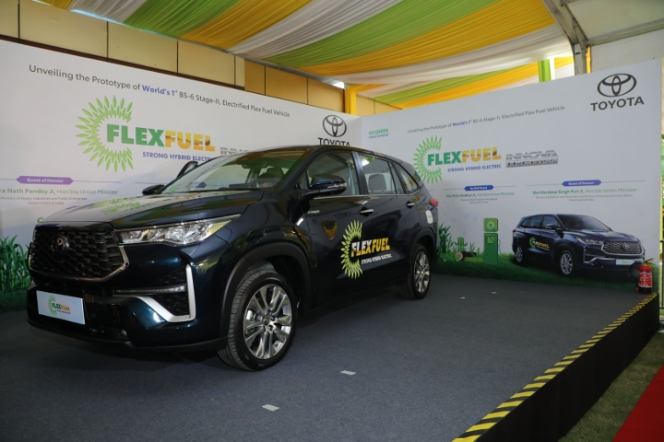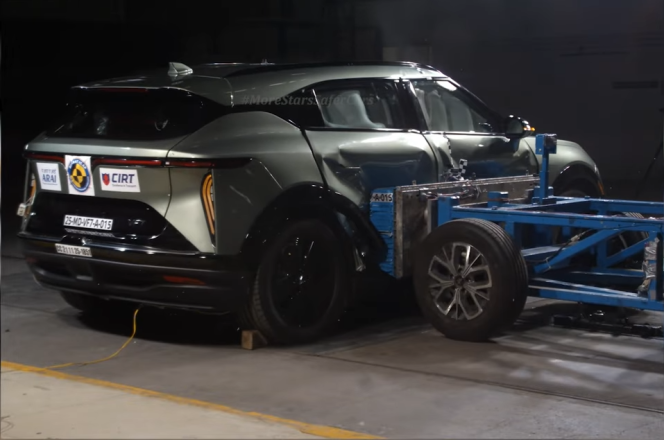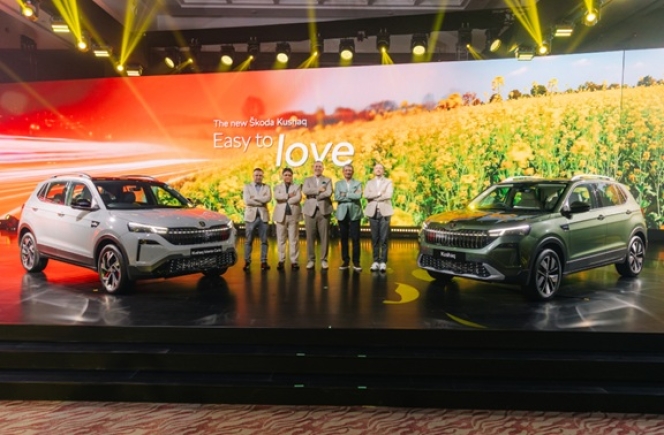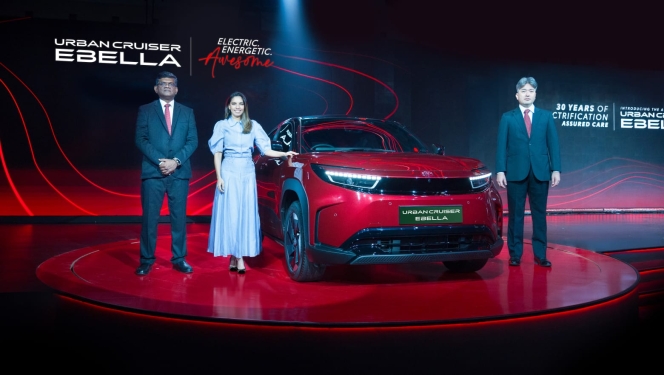Toyota Kirloskar Motor Bats For Electrified Flex Fuel Vehicles
- By MT Bureau
- August 13, 2024

Reiterating its commitment to carbon neutrality by 2050 and to achieve net zero carbon emissions in manufacturing operations by 2035 as per the Toyota Environmental Challenges 2050 (TEC 2050), Toyota Kirloskar Motor (TKM) has announced that it is advancing greener mobility solutions with greater agility. It is working to introduce and support multiple clean technologies considering various factors such as the current energy mix, unique consumer needs, infrastructure readiness and the Government’s diversified efforts towards becoming ‘Atma Nirbhar’ in energy by 2047.
Taking into consideration India’s rapid rise in fossil fuel consumption along with imports, TKM has once again underlines the world’s first BS6 Stage II Electrified Flex Fuel Vehicle prototype that it showcased last year. The company is of the opinion that such a fuel technology solution can help overcome the challenge of lower efficiency of ethanol that is associated with Flex Fuel Vehicles.
Stating that this is caused due to Ethanol’s lower energy density, the company states that Electrified Flex Fuel Vehicles (FFV-SHEVs) that combine a flex fuel engine and an electric powertrain are the best bet.
This green vehicle technology, according to the company, has the lowest well-to-wheel carbon emissions, and a favourable policy support can establish strong traction with consumers.
Vikram Gulati, Country Head and Executive Vice President, Corporate Affairs and Governance, Toyota Kirloskar Motor, mentioned that bio-fuels can reduce dependence on fossil fuels and yield environmental and economic benefits. “In this context, Ethanol, as an indigenous and clean energy source, holds immense potential for India's energy security and environmental goals. By significantly reducing fossil fuel consumption and cutting down on carbon emissions, ethanol not only supports our national agenda of carbon neutrality but also bolsters the agrarian economy by creating jobs and increasing farmer incomes,” he added.
Informing that TKM is making relentless efforts towards the future of sustainable mobility by adopting a multiple technology pathway approach which includes biofuel energy driven vehicle powertrains, Gulati emphasised the significance of multiple energy pathway approach towards achieving carbon neutrality.
VinFast VF 6 And VF 7 Secure 5-Star Bharat NCAP Safety Ratings
- By MT Bureau
- January 21, 2026

VinFast India has announced that its VF 6 and VF 7 electric SUVs have been awarded 5-star safety certifications by the Bharat New Car Assessment Programme (Bharat NCAP). These ratings represent the highest safety tier under the Indian government's vehicle assessment framework, which evaluates occupant protection through crash testing protocols.
The Bharat NCAP data reveals that the VF 6 scored 27.13 out of 32 points for Adult Occupant Protection (AOP) and 44.41 out of 49 points for Child Occupant Protection (COP). The VF 7 recorded 28.54 points in AOP and 45.25 points in COP. During frontal impact assessments, both models received maximum scores of 4.000 for head, neck, and upper leg protection for both driver and passenger. In side impact tests, both vehicles achieved scores of 16.000 for adults and 8.000 for children.
The assessment included a pole side impact test, where the head injury values for the VF 6 and VF 7 were 109 and 131, respectively. These figures are below the Bharat NCAP threshold of 700, indicating the performance of the vehicle structures in lateral collisions. Both SUVs are manufactured at VinFast’s facility in Tamil Nadu and utilise an electric vehicle platform equipped with seven airbags.
The vehicles incorporate Advanced Driver Assistance Systems (ADAS), with features varying by specification. These systems include Adaptive Cruise Control, Emergency Lane Keeping Assist and Automatic Emergency Braking for both front and rear. Other technologies integrated into the models include Blind Spot Detection and Auto Lane Changing Assist, designed to monitor traffic conditions and assist in collision avoidance.
This certification follows previous safety recognitions for the brand, including a five-star rating from ASEAN NCAP for the VF 8 model. The VF 6 and VF 7 are part of a domestic ecosystem that includes a local manufacturing plant, charging infrastructure, and a retail network established through partnerships with Indian stakeholders.
Tapan Ghosh, CEO, VinFast India, said, “The 5-star safety ratings awarded to VF 6 and VF 7 by Bharat NCAP mark an important milestone, underscoring the quality and high safety standards of VinFast’s electric vehicles in India, one of the world’s largest automotive markets. These results show that VinFast EVs are built on a robust engineering foundation and meet stringent safety assessment requirements. We remain committed to continued investment in product improvement, delivering electric vehicles that are not only environmentally friendly and technologically advanced, but also provide customers with confidence and peace of mind throughout the journey toward electrified mobility.”
Skoda Auto India Intros Updated Kushaq With New Transmission Options And AI Features
- By MT Bureau
- January 21, 2026

Skoda Auto India has launched the updated Kushaq, introducing technical and feature enhancements to its mid-size SUV. The model, which was the first vehicle developed under the India 2.0 strategy, now incorporates an eight-speed torque converter automatic transmission and integrated artificial intelligence.
The Kushaq comes with the Skoda Super Care package, providing a four-year warranty, four years of roadside assistance, and four labour-free services. Pre-bookings are open for INR 15,000, with deliveries scheduled to begin by the end of March 2026.
The vehicle debuts Skoda’s Modern Solid design language in India, featuring a new front grille with an illuminated light band, LED headlights, and connected taillights with sequential indicators. For the first time, the Monte Carlo variant is available from the start of sales. The SUV also introduces three colours: Shimla Green, Steel Grey and Cherry Red.
The new Kushaq offers two engine options and a revised range of automatic transmissions. The 1.0 TSI engine, producing 85kW and 178Nm, is now paired with a segment-first eight-speed torque converter or a six-speed manual gearbox. The 1.5 TSI engine, delivering 110kW and 250Nm, continues with the seven-speed DSG automatic and now features disc brakes on all four wheels.
Ground clearance remains at 188 mm, maintaining the vehicle’s capability for varying road conditions. The interior has been updated with a panoramic sunroof and a rear-seat massage function. Practical features include a 491-litre boot, expandable to 1,405 litres, and a 10.25-inch digital cockpit in higher specifications.
The infotainment system features a 10.1-inch screen with an AI voice assistant powered by Google Automotive AI. This system utilizes Gemini technology to provide real-time information and hands-free control over climate and media, specifically tuned to recognise Indian accents.
Safety remains a focus, with the Kushaq retaining its five-star Global NCAP rating. Six airbags and over 25 safety features are now standard across all variants, including: Electronic Stability Control (ESC), rain-sensing wipers, auto-dimming interior mirror and rear wiper & defogger.
Klaus Zellmer, CEO, Skoda Auto, said, “The updated Kushaq reinforces the importance of India as the springboard for Skoda Auto’s strategy to grow our international markets. The Kushaq has rapidly established itself with customers in India and as an export to ASEAN and the Middle East. Now we are setting the next benchmark for the model’s overall value proposition.”
Ashish Gupta, Brand Director, Skoda Auto India, said, “At Skoda, our mission is to democratise European technology and make it more accessible to customers across India. With the premiere of the new Kushaq today, we further build our legacy of having a class-leading range of ‘real automatics’ across our portfolio.”
Toyota Kirloskar Motor Launches All-Electric Urban Cruiser Ebella
- By MT Bureau
- January 20, 2026

Toyota Kirloskar Motor has introduced the Urban Cruiser Ebella, its first Battery Electric Vehicle for the Indian market. This launch signifies Toyota's strategic entry into the country's growing electric mobility sector, underpinned by its three-decade legacy in global electrified technology. The vehicle embodies Toyota's multipath approach to sustainable transportation, aiming to broaden consumer choice in electrified powertrains while supporting national objectives for decarbonisation and energy independence.
The all-electric SUV is designed with a bold and aerodynamic silhouette, featuring a signature hammerhead front, premium LED lighting and dual-tone exterior options. Its spacious and premium cabin is crafted with dual-tone finishes, ambient lighting, ventilated front seats and a panoramic roof. Advanced technology is central to the experience, integrating a unified digital cockpit with a large combimeter and multimedia system, complemented by a JBL premium sound system.
Performance is delivered through two battery options, providing a driving range of up to 543 kilometres. The vehicle supports both AC and DC fast charging, with intelligent features for remote operation and scheduling via the i-Connect system. Safety is a paramount focus, with the inclusion of Level 2 Advanced Driver Assist Systems, a high-tensile body structure, seven airbags and a 360-degree camera.
Ownership is designed to be comprehensive and reassuring. The company is backing the vehicle with an eight-year battery warranty, assured buyback programmes and flexible Battery-as-a-Service options. To ensure expert support, over 500 service centres across the country have been equipped with specialised BEV diagnostic tools and infrastructure, staffed by more than 2,500 master technicians trained in electrification.
Bookings for the Urban Cruiser Ebella will commence on 20 January 2026, with pricing details to be announced in the near future.
Masakazu Yoshimura, Chairman, Managing Director & Chief Executive Officer, Toyota Kirloskar Motor, said, “The introduction of All-Electric Urban Cruiser Ebella is a key enabler towards furthering our multi-pathway approach, where our aim is to contribute towards carbon neutrality while leaving no one behind. Now, with the launch of All-Electric Urban Cruiser Ebella in India, we remain firmly committed to advancing our support towards India’s transition to greener mobility. With our compelling product line-up, technology leadership, strong after sales services and dealership network, we intend to achieve our sustainable mobility goals while providing freedom of mobility to all.”
Tadashi Asazuma, Deputy Managing Director, Toyota Kirloskar Motor, said, “With three decades of global expertise in electrified technologies, Toyota has consistently invested in focused innovation to address diverse mobility needs. As a result, our customers worldwide have already contributed to saving more than 197 million tonnes of CO₂ with over 38 million electrified vehicles on the road worldwide. At the heart of this progress is our philosophy of Mass Happiness, with carbon neutrality as its foundation. This has guided our preparation for Toyota Kirloskar Motor’s first BEV, the All-Electric Urban Cruiser Ebella. Our pre-launch readiness goes beyond the product to ensure a seamless, worry-free ownership experience, aligned with Toyota’s global standards and our vision for future-ready, sustainable mobility in India.”
Sabari Manohar, Executive Vice President, Sales–Service–Used Car Business & Profit Enhancement, Toyota Kirloskar Motor, said, “The All-Electric Urban Cruiser Ebella, showcases an authentic SUV character inspired by its ‘Urban Tech’ design philosophy. With a bold hammerhead expression and three-dimensional surfaces, the BEV delivers a strong, futuristic road presence. It is available with 49 kWh and 61 kWh battery options, with latter pack producing 128 kW and 189 Nm of torque and offering a driving range of up to 543 km (Certified by ARAI) on a single charge. The vehicle is backed by a robust service network, Electrified Technology trained dealer teams, an 8-year battery warranty, flexible ownership programmes (Assured Buy Back & Battery as a Service), and an expanding charging ecosystem to ensure Assured care and delightful BEV ownership experience.”
Mercedes-Benz India Expands Retail Network With New Outlet In Bhopal
- By MT Bureau
- January 20, 2026

Mercedes-Benz India has expanded its retail network with the inauguration of a new luxury sales facility in Bhopal. Operated by its established franchise partner, Landmark Cars, this strategic move reinforces the brand's commitment to penetrating key emerging luxury markets and bringing its world-class offerings closer to discerning customers in growing urban centres.
Situated in the premium commercial complex of Habib Ganj, the 1,100-square-foot showroom was completed in just four and a half months, demonstrating the agility of the brand's retail operations. Its location ensures strong connectivity and access to Bhopal's existing and prospective luxury car clientele.
The outlet employs the innovative 'Stars at Mercedes-Benz' retail format, designed for high flexibility within urban settings. This concept allows for the seamless display of the brand's entire portfolio – including Mercedes-Maybach, AMG, G-Class and core Mercedes-Benz models – within a single space. Adaptable brand elements and optimised layouts enable easy switching between vehicle displays while maximising the use of luxury display areas. The format also dedicates space to exclusive customer consultations, ensuring a focused and personalised client experience.
Staffed by a team of trained professionals, this facility adds to Landmark Cars' network of nine Mercedes-Benz outlets nationwide, with plans for further growth based on market potential. This opening is part of Mercedes-Benz's broader strategy to deepen its presence across India's luxury consumption hubs. By combining modern retail formats with curated customer experiences, the brand continues to strengthen its leadership position, now boasting a presence in over 50 Indian cities with more than 140 luxury touchpoints.
Emrah Oezer, CFO and Executive Director, Mercedes-Benz India, said, “Mercedes-Benz continues its strong momentum in the Indian market in 2025, remaining the most desirable luxury automotive brand. Mercedes-Benz witnessed increase in sales in it’s top-end vehicles and BEV portfolio, along with strong performance in terms of revenue. This year we will launch 12 new products, expand of our local production portfolio, launch the MB.Charge Public, expand into new markets and invest in upgrading our entire network. Bhopal is an important emerging market for Mercedes-Benz and with a new state-of-art showroom, our discerning customers in Bhopal will have an elevated luxury retail experience synonymous with the values of trust, prestige and excellence associated with Mercedes-Benz.”
Sanjay Thakker, Chairman & Executive Director, Landmark Cars, said, “We are delighted to further strengthen our partnership with Mercedes-Benz by inaugurating a world-class luxury sales outlet in Bhopal, a city witnessing steady growth in premium automotive aspirations. This new facility reflects the global luxury standards of Mercedes-Benz, seamlessly integrating modern design, digital-enabled consultations and a highly personalised customer engagement model. Designed to deliver an immersive and refined purchase journey, the showroom offers customers a holistic luxury ecosystem under one roof, focused on exclusivity, comfort and convenience. We are confident this new touchpoint will resonate strongly with customers in Bhopal and the surrounding region, reinforcing Mercedes-Benz as the most aspirational and trusted luxury automotive brand.”







Comments (0)
ADD COMMENT